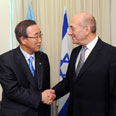
Ban calls Gaza situation 'heartbreaking'
UN chief meets with Olmert before leaving for visit to Strip, where he tours UNRWA facilities hit by IDF fire. Later he visits Sderot, condemns rocket fire on south
He did not meet with Hamas members, but toured a UN school and two UNRWA facilities hit by IDF fire. During the visit, Ban called on Israel and Hamas to show restraint and honor their recent ceasefire.
Ban also toured Sderot in order to assess the damage done by rockets fired from Gaza. A number of residents awaited his arrival near the city's police department and demanded that he examine the damage as he did in his earlier visit to the Strip.
Sderot Mayor David Buskila played host to the UN chief. Buskila told Ban that the residents had been living under the threat of Qassam rockets for eight years. "Our children live with the question of how to survive, not how to live," he said.
Ban said he was alarmed by the rocket threat in the south and condemned it. He said he realized the community was living in a state of constant anxiety and expressed hope that steps would be taken to make sure that Israelis and Palestinians would live in peace.
The UN chief also expressed support for the two-state solution, and said a more durable ceasefire needed to be obtained in Gaza in order to keep the crossings with Israel and Egypt open.
Earlier, in Gaza, Ban said he was heartbroken that it took so long to reach a ceasefire. He also said the truce remains fragile and urged the sides to show "maximum restraint."
This would be the first visit by a high-ranking official to Gaza since Hamas took over Gaza in June 2007. Ban arrived at the Erez crossing where he put on a bullet-proof vest, before the convoy of vehicles began traveling towards Gaza.
Before leaving for Gaza, the UN chief met with Prime Minister Ehud Olmert in Jerusalem. The Prime Minister's Office said that Ban told Olmert he appreciated Israel's decision to hold fire in the Gaza Strip and that the two discussed ways to maintain a stable truce.
The prime minister reiterated his stance that the UN must take care of the efforts to rebuild Gaza, together with the international organizations and with the help of Egypt, the Palestinian Authority and the moderate states.
"Hamas must not gain any legitimacy from the restoration process, as it is the one responsible for the destruction in the Strip," Olmert said.
'Worse than 10 earthquakes'
Many of Gaza's residents continued Tuesday to walk between the destruction which used to be their homes, in an attempt to locate what has been left from their property.
According to Hamas, 5,000 houses, 16 government buildings and 20 mosques were completely destroyed in the IDF operation, and some 20,000 structures were damaged.

Car damaged in Strip (Photo: AP)
The Abu Halima brothers returned to their home in the hopes of recovering some of their property which had not been damaged in the bombings. They also hoped to locate their father's body between the rubble in order to bury him.
The brothers said that their house had been hit by a phosphorus shell fired by the IDF and that five of their family members had been killed.
"Two weeks have past and it still burns," said Mahmoud Abu Halima, 20, as he picked up the remnants of the shell.
The sights of damage in the town of Jabliya, where not one building remained intact, are reminiscent of an apocalyptic view. According to Ashraf Faraj, a 42-year-old engineer, the results of the bombings "are worse than 10 earthquakes".
Mahmoud Hassan, 52, found it difficult to hold back his tears, saying he lost all his belongings in the attacks.
Livni: Talks with Hamas only about Shalit
Foreign Minister Tzipi Livni visited the College for Management in Rishon Lezion and addressed Operation Cast Lead. She spoke of the diplomatic efforts made and the arrival of European leaders in Israel after the ceasefire declaration.
"This is not an ordinary sight when such an amazing show of world leaders arrives in Israel after the heavy blow Israel dealt Gaza, and believe me, the situation in Gaza is not simple," she said.
According to Livni, "We embarked on the operation after forming a coalition of Western and Arab countries. I believed that our deterrence abilities would not be enough in a strike from the air, and therefore we also needed a ground offensive. This is why I objected to the 48 humanitarian hours they asked us to give them.
"I believed then and I believe now that we must respond forcibly. The question of the State of Israel's power of deterrence is still being tested. If Hamas fails this test they'll be hit again."
She added that "our people deserve to be proud of this victory. Hamas is a group against which we fight. With Hamas we must reach an agreement only on one issue – (kidnapped soldier) Gilad Shalit.
"We shouldn’t talk about it in public because they're taking advantage of our solidarity and desire to see Gilad Shalit return. This is the only issue we should talk to them about."
Eli Senyor contributed to this report










